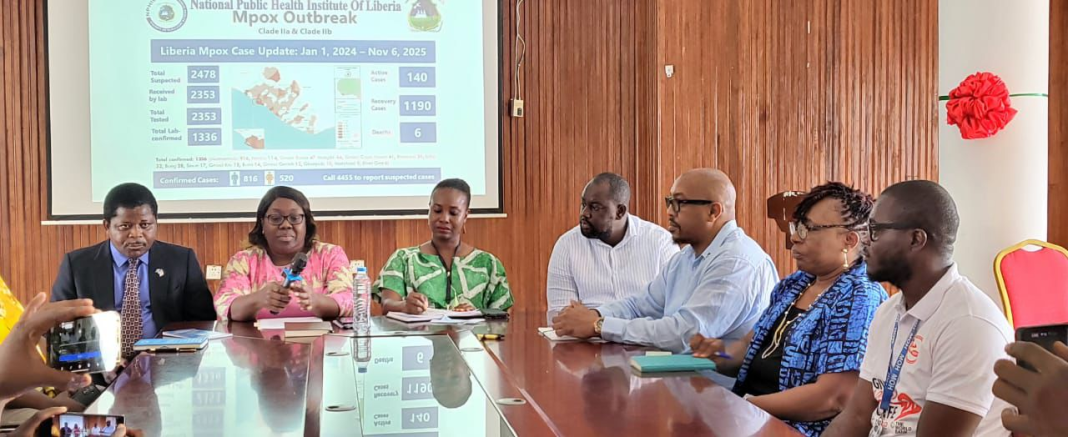Liberia is reporting a renewed surge in Mpox infections roughly one month after the dismissal of Dougbeh Chris Nyan as Director General of the National Public Health Institute of Liberia (NPHIL), the Ministry of Health said in a situation update released Friday.
The update, signed by Chief Medical Officer Dr. Catherine Cooper, shows that since the outbreak began in September 2024 the country has recorded 2,447 suspected Mpox cases. Of 2,309 samples tested, 1,308 have been confirmed positive — a cumulative positivity rate of 56.6 percent. The virus has been detected in 65 of Liberia’s 98 health districts, indicating widespread community transmission across all 15 counties.
There are currently 148 active cases under monitoring and receiving treatment in infectious disease hospitals, isolation centers and through home-based care. Montserrado County remains the epicenter, accounting for 57 percent of active cases concentrated in Bushrod, Commonwealth, Central Monrovia and Somalia Drive. Nimba accounts for 18 percent of active cases, followed by Margibi (7 percent), Grand Bassa (5 percent) and Grand Kru (4 percent); remaining counties report 2 percent or fewer.
Recovery efforts have produced measurable results: 1,154 patients have fully recovered following treatment and follow-up. Six deaths have been confirmed, yielding a case fatality rate of 0.5 percent. The Ministry said the relatively low fatality rate reflects improvements in clinical care, surveillance and community outreach, but cautioned that new cases continue to appear and sustained vigilance is needed.
The rise in cases comes about a month after President Joseph Boakai removed Dr. Nyan in early October, following a Board of Directors resolution that said the director had been working without board involvement. Health officials have not linked the personnel change directly to the recent rise in infections.
In response to the increase, the Ministry of Health, in collaboration with NPHIL and international partners, has launched a new 90-day national response strategy focused on aggressive case detection, expanded treatment capacity and intensified public education.
Measures include active case finding, ensuring confirmed cases are placed under appropriate care, and expanding services at the Liberia Center for Infectious Disease Hospital with additional supplies, laboratory equipment and diagnostic tools. Frontline workers will receive refresher training on Mpox management and standardized clinical guidelines.
The strategy also calls for stepped-up risk communication and community engagement with local and market leaders, youth organizations and community health volunteers to promote early reporting and safer hygiene and sexual practices.
The Ministry said it will begin awareness and sensitization activities in November, with a preventive ring vaccination campaign slated to start in early December and run through February 2026. The campaign targets people aged 18 and over, prioritizing high-risk populations and hotspots such as Montserrado.
Liberia received 42,720 Mpox vaccine doses in September 2025, donated by a consortium that includes the U.S. Centers for Disease Control and Prevention, Africa CDC, Gavi, UNICEF and CEPI. The government aims to administer all doses to high-risk groups by the end of January 2026 and to reach at least 80 percent of the population with awareness messaging in priority counties.
To coordinate operations, daily Incident Management System meetings have been reactivated to address logistics — including fuel, cold chain maintenance and supplies for vaccine deployment — and weekly infection-prevention audits will be conducted in health facilities to protect health workers.
The Ministry has set concrete targets for November 2025–January 2026: detect and investigate at least 90 percent of suspected Mpox cases within 24–48 hours, test all samples and return results within 48 hours, and achieve zero preventable Mpox-related deaths.
“Liberia is at a critical juncture in its response to Mpox,” Dr. Cooper said in the situation update, warning that without bold, coordinated interventions the outbreak could escalate and pose serious risks to lives, the health system and the economy. She called on community leaders, civil society and the media to support awareness and vaccination campaigns.
The Ministry of Health said it will continue to work with national and international partners, maintain transparency and take all necessary measures to bring Mpox transmission under control.


